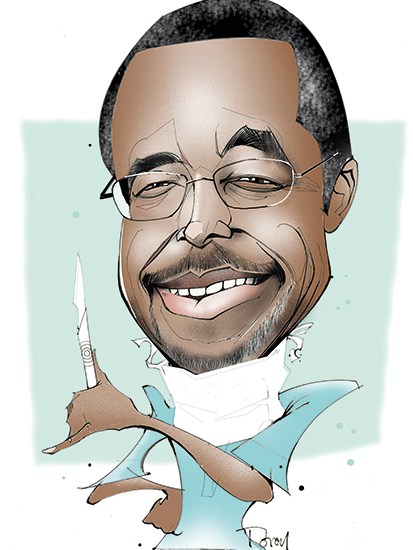Washington DC
Ben Carson is relaxed. ‘He’s always relaxed,’ says an aide. The next televised Republican primary debate is two days away, but Dr Carson is about to begin his first rehearsal for it. The preternatural calm he exudes is presumably what gave him his steady hands during the 22-hour operation that led to him becoming the first surgeon to successfully separate Siamese twins fused at the head.
That operation is part of the Carson legend: growing up poor, black, becoming chief of neurosurgery at Johns Hopkins aged 33. This life story has aided an improbable presidential bid that is now starting to look more plausible. Carson is polling second in a Republican field of 16 and he has momentum. He might be the man to stop Donald Trump, something the other candidates have failed to do. This week, Carson pulled closer to ‘the Donald’, with one poll giving him 23 per cent support to Trump’s 27.
He never intended to run for office, he tells me with practised or sincere modesty: the reluctant draftee. ‘I was going to retire but there were so many people clamouring for me to do it that I finally had to start listening to what they were saying.’
Carson became a national figure overnight when he appeared at a White House prayer breakfast and told his life story, as well as delivering a few sideswipes to President Obama, sitting one chair away. He was brought up in Detroit by a single mother, who was herself one of 24 children and who got married, aged 13, to a man who turned out to be a bigamist and deserted them. She was illiterate but, as Carson related, she used to make him and his brother read two library books a week and give her written reports, which she would pretend to read.
Given his remarkable journey through life, does he feel, like President Bush, that providence has chosen him? He takes comfort, he says, from the fact that the pundits had been certain he could never put together a successful campaign. ‘I just said: ‘Lord, it sounds good to me. But if you really want me to do it, you’re going to have to open the doors.’ And the doors have been flung wide open. We are putting together a tremendous organisation. In about a week, we will have 500,000 donations from average Americans… So, you know, it is working.’
It is, if not a miracle, certainly impressive. The man who put together the campaign, a colourful Texan lawyer called Terry Giles, tells me they are raising almost $7 million a month and paying for staff in all 50 states. They do not have any of the billionaire supporters who had previously determined the outcome of the ‘money race’ but that doesn’t matter: they have Facebook and a multitude of small donors. Giles, a Carson friend for 20 years, says: ‘He has a photographic memory; he’s the smartest guy in the race… Americans are looking for a president with character, intellect and wisdom.’
People do seem to like Carson. His poll numbers shot up after he introduced himself to his biggest audience yet, the 24-million-strong TV audience for the first Republican primary debate. He leant heavily on the life story that night, and it seems to take up most of his speeches too. Isn’t it time for some policies, I ask: what would happen in the first 100 days of a Carson presidency?
‘I’d make it very clear to the Congress that we work for the people. It needs to be people–centric instead of government-centric,’ he says. ‘We just can’t continue to accumulate debt, and think that nothing is going to happen… It’s impossible for us to have a peaceful world if we don’t get out in front and act like the pinnacle nation of the world.’
These were generalities but his campaign staff say there will soon be detailed policy announcements, starting with foreign and defence. What then would Carson do about Isis? ‘We must recognise that their goal is to destroy us and to destroy our way of life… They represent an existential threat… We need to use every resource available to us — military, economic — not only to contain them but to eliminate them.’
‘Would you send troops?’
‘There are a lot of things that are available to us.’
‘Such as?’
‘There’s no way I would ever make it public.’
‘How many troops might you send?’
‘I would really consult with my generals and my experts in that area.’
That answer — I’ll ask the generals — is the one given by presidents in office but it also reminds me of Donald Trump’s ‘100 per cent foolproof’ but secret plan to defeat the jihadis. Trump — the frontrunner — and Carson are both outsiders who all the polls say are ahead of a vast pack of professional Republican politicians. There is a reason for that, the veteran political journalist Bob Schieffer tells me: they are doing the same thing, in different ways.
‘They’ve made a very accurate list of all the things that people are pissed off about. People are just mad… just fed up. Trump just seems to nail things that really irritate people. Carson has a more polite way of saying [what] Donald Trump is saying.’ Schieffer, now at Harvard, has been to every Iowa caucus since 1976. He believes Carson can win there. ‘People in Iowa are very nice…He’s the kind of person who, like Obama, will appeal to people there.’
Along the way, Carson might have some interesting things to say, especially about race. He is the only African-American from either party running for president. He says he ‘probably’ benefited from affirmative action — positive discrimination for black Americans — but that the time for it has passed. He advocates something called ‘compassionate action’ with no racial element. ‘It is not fair for my son, who has grown up in the lap of luxury and has had every advantage, to be evaluated on the same basis as some [white] kid from Appalachia whose father was killed in the coal mines when he was five years old.’
Carson likes to point out that five doctors signed the Declaration of Independence. Would Americans elect one as president? The US has had a former movie actor as president (Reagan) and a former haberdasher (Truman) but both had served long political apprenticeships. Carson’s candidacy seemed so unlikely at first that his aides had to damp down speculation that he was running simply to boost his celebrity and secure a big contract as a TV commentator.
He has since moved from being a novelty candidate to being a serious player, though it is still very early in the race. The pundits will say that his lead will evaporate. But then Carson has never listened to them.
Got something to add? Join the discussion and comment below.
Get 10 issues for just $10
Subscribe to The Spectator Australia today for the next 10 magazine issues, plus full online access, for just $10.
You might disagree with half of it, but you’ll enjoy reading all of it. Try your first month for free, then just $2 a week for the remainder of your first year.














Comments
Don't miss out
Join the conversation with other Spectator Australia readers. Subscribe to leave a comment.
SUBSCRIBEAlready a subscriber? Log in